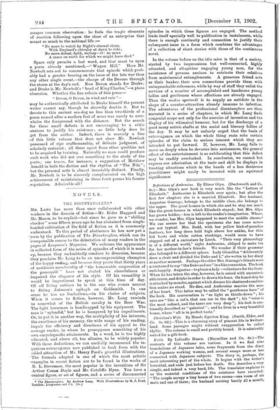Reflections of Ambrosine. By Elinor Glyn. (Duckworth and Co. 6s.)—Mrs.
Glyn's new book is very much like the "Letters of Elizabeth." Ambrosine is Elizabeth over again ; but after the first few chapters she is a married Elizabeth. Her husband, Augustus Gurrage, belongs to the middle class, she belongs to the upper. The great houses in which she and he stay are much like the great houses in which Elizabeth stayed; but Mrs. Glyn has grown bolder,—less is left to the reader's imagination. Where, we wonder, has Mrs. Glyn happened to meet the middle classes ? We can assure her that the specimens she has come across are not typical. Mrs. Dodd, with her yellow bird-of-paradise feathers, her long dress held high above her ankles, her thin kid boots and white cotton stockings, would seem to have stepped out of a caricature by Leech. "Their very phraseology is of a different world," sighs Ambrosine, obliged to make tea for her mother-in-law's friends. We wonder if their grammar also belonged to a different sphere. Lady Glenellen "deliberately drew a chair and divided the Duke and I," she writes in her diary at another moment. Perhaps the elder Mrs. Gurrage's friends were accustomed to say "the Duke and me " in a li ke connection. The book ends happily. Augustus—to please a lady—volunteers for the front. When he has taken the step, however, he is seized with uncontrol- able terror, and drinks in order to drown his fears. On board ship he is attacked by measles, against which disease his shattered constitu- tion makes no stand. He dies, and Ambrosine marries the man of her heart. This latter may be called the "gentleman hero" of the book. His conversation is "as light as thistle-down " ; his eyes are "like a cat's, that can see in the dark" ; his "voice is the most refined, and the tones are very deep"; his look is con- tinually described as "quizzical "; and he lives in a very beautiful house, where " all is in perfect taste."


















































 Previous page
Previous page